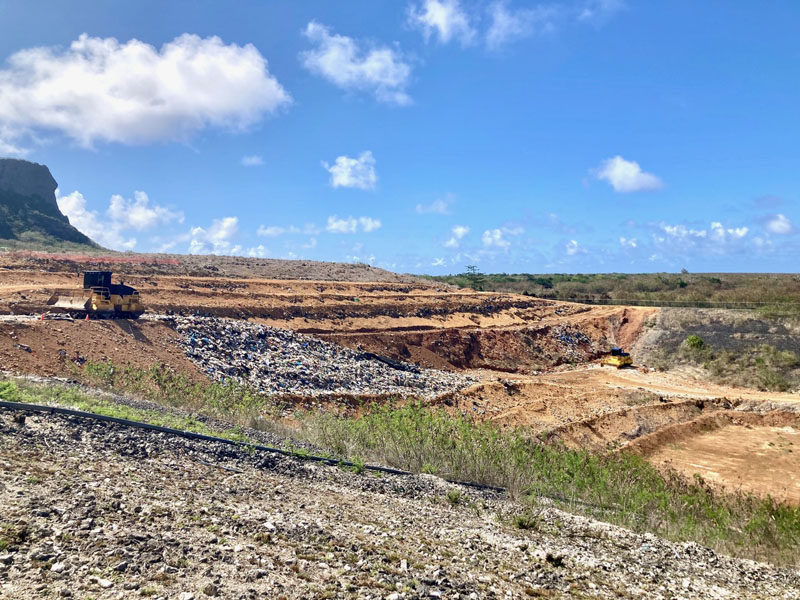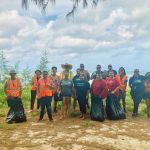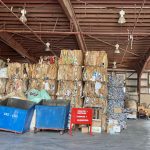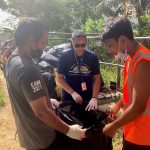SOLID WASTE MANAGEMENT:
‘It should be everybody’s responsibility’

Cell 1 of the Marpi landfill is now just a few feet short of being full, as it nears it maximum 206-foot capacity. It has been used for 18 years now since the Marpi landfill opened in 2003. Cell 2, which is set for a rehabilitation project beginning June, is good for 15 years, and will be used next. (Photos by IVA MAURIN)
For Saipan Southern High School student Ray Babauta Jr., the worst environmental problem here on island is litter with people dumping trash just about everywhere.
Babauta, along with his schoolmates, volunteered to pick up trash along Makaka Beach —behind the Imperial Pacific International building—in Garapan last Saturday, May 8, as part of the beach cleanup organized by the Bureau of Environmental and Coastal Quality every first Saturday of the month.
“We should all just volunteer to help clean the community, together as one, unite and just do whatever to keep our place clean,” Babauta said. “It’s important to keep the environment clean so that trash doesn’t pile up. That can cause global warming and changes in the climate, and can give Saipan a bad look to foreigners, people from different places.”
The most common waste that volunteers pick up during beach cleanups are cigarette butts, beer cans, and plastics. But, when responding to reports on illegal dumping in common areas and remote areas on island, the most common that BECQ finds range from household trash, furniture, appliances, and gallon containers of used cooking oil.
In an interview, environmental specialist Marlyn Naputi highlighted a major issue that ties directly with proper solid waste management—the lifespan of the CNMI’s sole landfill. To date, cell 1, the largest of the cells, and which has been used for 18 years now since the Marpi landfill opened in 2003, is short of a few feet being full as it nears its maximum 206-foot capacity. Cell 2, set for a rehabilitation project beginning June, is good for 15 years, and will be used next.
“To extend the lifespan of our only landfill, waste reduction and recycling is the best way to start. When we practice reducing, reusing, and recycling our waste, we help send less waste to the landfill thus, extending its life,” Naputi explained.
Reduce, recycle, and refuse!
Proper waste management begins at home. We can lessen the amount of trash we generate by reducing the amount of products we buy, by recycling, and by refusing to consume things we do not really need—and that end up unused and just stored somewhere, or even worse, dumped.
Businesses have started to embrace being green, with no less than Saipan Chamber of Commerce president Joseph C. Guerrero challenging businesses to take steps to reduce consumption, stressing that businesses should always strive to make a conscious effort to conserve, reduce the use, and look out for the environment, because without a good environment, businesses will suffer.
To encourage more businesses to use less waste, the Division of Coastal Resources Management has the “Plastic Free Marianas” pledge program, to address the environmental and public health impacts of single-use plastics on island, to share the benefits of generating less waste, and to adopt a zero-waste lifestyle.
There are also BECQ-permitted recycling facilities, where people can drop their recyclable wastes: the DPW Recycling Center at the Marpi Transfer Station (322-2745), FSM Recycling (322-2700), and Art Man Recycling (234-8079). Used car batteries (lead-acid) are accepted at Atkins Kroll (234-5911) and at Hans Corp. (234-7586).
Further, the Micronesian Islands Nature Alliance has a program called “Adopt-a Bin” where recycling and mixed waste bins are placed at popular beach sites to help guide people on waste segregation.
“While practicing waste reduction and recycling has its benefits, when it comes to littering and illegal dumping, it comes down to an individual’s consideration for their environment. Does he or she have respect for the health of the environment?” Naputi raised.
Enforcing litter control
The CNMI has an existing law against those who litter. Public Law 19-53, or the Commonwealth Littering Act of 1989, as amended, has a penalty fee of up to $5,000 to anyone who litters. Penalties are assessed based on the weight, type, and location of when the littering took place.
CRM Permit manager and chief enforcement officer Sam Sablan, in an interview with Saipan Tribune, stressed the need to focus more on litter control to curb the trash problem all over the island.
“We should focus more on litter control, rather than beach cleanups, because beach cleanups enable picnickers to just rely on cleaners to do this on a monthly basis, and it’s really not working. We’ve been doing this for many years and, in fact, it hasn’t improved, it’s gotten worse.”
Sablan led the group of BECQ volunteers at the Makaka Beach cleanup last Saturday.
“The next step would be focusing on enforcement—having enforcement officers to come out here on the weekends, to work on weekends, enforce and give citations as necessary, encouraging people to dispose their waste properly, doing a lot of outreach.”
Sablan also stressed that proper solid waste management is a shared responsibility, not just the government.
“It’s a responsibility of all people, yet people rely on the government. Then, we can focus more of a lot of our efforts into developments and regulating the developments rather than picking up trash, which should be everybody’s responsibility.”
Help keep the island clean and report any littering and illegal dumping to BECQ at 664-8500.
- Volunteers from Saipan Southern High School and the Bureau of Environmental and Coastal Quality met early Saturday morning, last May 8, to pick up trash along the shores of Makaka Beach, behind the Imperial Pacific International building in Garapan.
- Segregated recyclables at the Marpi Transfer Station at the Lower Base. Drop your recyclables at the Transfer Station, open Mondays until Saturday (except Wednesdays) from 7:30am to 1:30pm.
- Saipan Southern High School student Ray Babauta, Jr., right, helps volunteers from the Bureau of Environmental and Coastal Quality load a bag of trash his school helped pick up at the beach cleanup held last Saturday, May 8, at Makaka Beach, behind the Imperial Pacific International building in Garapan. For Babauta, the worst environmental problem on island is litter, with people dumping trash everywhere.


























